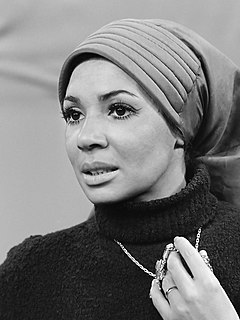
Dame Shirley Veronica Bassey is a Welsh singer. Best known for her career longevity, powerful voice and recording the theme songs to three James Bond films, Bassey is widely regarded as one of the most popular vocalists in Britain.

The Mamas & the Papas were an American folk rock vocal group formed in Los Angeles, California, which recorded and performed from 1965 to 1968. The group was a defining force in the music scene of the counterculture of the 1960s. The group consisted of Americans John Phillips, Cass Elliot, and Michelle Phillips and Canadian Denny Doherty. Their sound was based on vocal harmonies arranged by John Phillips, the songwriter, musician, and leader of the group, who adapted folk to the new beat style of the early 1960s.
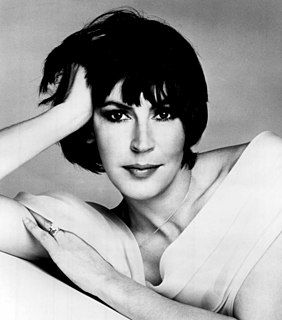
Helen Maxine Reddy was an Australian-American singer, actress, and activist. Born in Melbourne to a showbusiness family, Reddy started her career as an entertainer at age four. She sang on radio and television and won a talent contest on the television program Bandstand in 1966; her prize was a ticket to New York City and a record audition, which was unsuccessful. She pursued her international singing career by moving to Chicago, and subsequently, Los Angeles, where she made her debut singles "One Way Ticket" and "I Believe in Music" in 1968 and 1970, respectively. The B-side of the latter single, "I Don't Know How to Love Him", reached number eight on the pop chart of the Canadian magazine RPM. She was signed to Capitol Records a year later.

"Son of a Preacher Man" is a song written and composed by American songwriters John Hurley and Ronnie Wilkins and recorded by British singer Dusty Springfield in September 1968 for the album Dusty in Memphis.
"Dream a Little Dream of Me" is a 1931 song with music by Fabian Andre and Wilbur Schwandt and lyrics by Gus Kahn. It was first recorded in February 1931 by Ozzie Nelson and also by Wayne King and His Orchestra, with vocals by Ernie Birchill. A popular standard, it has seen more than 60 other versions recorded.

"Make Your Own Kind of Music" is a pop song written by Barry Mann and Cynthia Weil, which became a Top 40 hit for Cass Elliot in 1969.
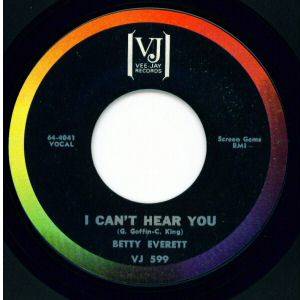
"I Can't Hear You No More" is a composition written by Gerry Goffin and Carole King. It was originally recorded as "I Can't Hear You" in 1964 by Betty Everett. The most successful version was the 1976 top 40 single by Helen Reddy.

“Creeque Alley” is an autobiographical hit single written by John Phillips and Michelle Phillips of The Mamas and the Papas in late 1966, narrating the story of how the group was formed, and its early years. The third song on the album Deliver, it peaked at #5 on the U.S. Billboard pop singles chart the week of Memorial Day 1967, becoming their last Top 10 hit. It made #9 on the UK charts, and #4 on the Australian and #1 on the Canadian charts.

"Words of Love" is a song appearing on the album The Mamas & the Papas. The song was written by John Phillips, and featured Cass Elliot as the primary vocalist. It was released as a single in November 1966.

"Basin Street Blues" is a song often performed by Dixieland jazz bands, written by Spencer Williams in 1928 and recorded that year by Louis Armstrong. The verse with the lyric "Won't you come along with me / To the Mississippi..." was later added by Glenn Miller and Jack Teagarden.
One Way Ticket may refer to:

Cass Elliot is the fourth studio album released by Cass Elliot and the first album recorded for RCA Records, being released in January of 1972.

Never Never Never is a 1973 album by Shirley Bassey. It features the hit single title track, which was a UK top 10 hit, which became one of Bassey's best-known songs. The album also became a top 10 hit in the UK and was a moderate hit in the US.
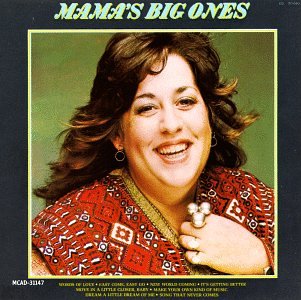
Mama’s Big Ones is a compilation album of previously released material as noted below, by Cass Elliot.

"It's Getting Better" is a song written by Barry Mann and Cynthia Weil that was a sunshine pop hit single in 1969 for Mama Cass.

"Burn My Candle" is the debut single by Shirley Bassey. It was recorded in February 1956, when Bassey was nineteen years old, and released later that month on a 78 rpm shellac disc, with "Stormy Weather" on the B-side. The record was produced by Johnny Franz, with Angela Morley and her Orchestra backing Bassey. The song was written for Bassey by Ross Parker at the behest of Bassey's then-manager, Michael Sullivan, who was seeking a song to make Bassey stand out. The BBC banned the playing of the record, presumably due to its suggestive lyrics. In his 2010 biography of Bassey, John L. Williams writes that:
The song taken in isolation, is blatantly sexual but hardly convincing, as the double entendres of the title give way to single entendres in the bridge – 'There's "S" for Scotch, that's so direct / And for straight and simple sex / "I" for invitation to / A close relationship with you / "N" for nothing bad nor less / "S-I-N", that's sin, I guess.'...And that, right there, is the key to Shirley Bassey's early success: she was blatantly sexy and yet somehow, if not innocent, at least not too knowing.

Good, Bad but Beautiful is a 1975 album by Shirley Bassey. In the first half of the decade, Bassey recorded nine albums, with three making the top ten. In March 1975, Bassey released a compilation that became her highest-charting album to date, The Shirley Bassey Singles Album (#2), and reflects the momentum Bassey had maintained since her 1970 "comeback". Good, Bad but Beautiful, released in the autumn of 1975, spent seven weeks on the UK Albums Chart, peaking at #13, and earned a silver disc. The album reflects the formula that brought Bassey back to the charts: a combination of contemporary songs combined with her forte of standards, show tunes, and torch songs, featuring arrangements aimed squarely at the adult contemporary, or middle-of-the-road, audience. This was also achieved by modifying her backup orchestra to include electric guitars, a string and brass section with a more contemporary sound, and drumming that is more soft rock-oriented than jazz-oriented, while side two's opener, "Feel Like Makin' Love" displays a smooth jazz style.
"Amoureuse" is a French language composition by Véronique Sanson introduced on her 1972 album of the same name. Rendered in English the song became a hit single for Kiki Dee and – as "Emotion" – for Helen Reddy.
"The Second Time Around" is a song with words by Sammy Cahn and music by Jimmy Van Heusen. It was introduced in the 1960 film High Time, sung by Bing Crosby with Henry Mancini conducting his orchestra, and was nominated for the Academy Award for Best Original Song. It lost out to "Never on Sunday".
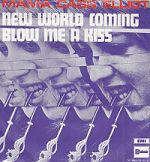
"New World Coming" is a pop song written by Barry Mann and Cynthia Weil which became a hit for Cass Elliot in early 1970.

















